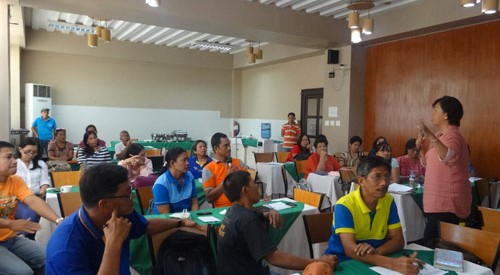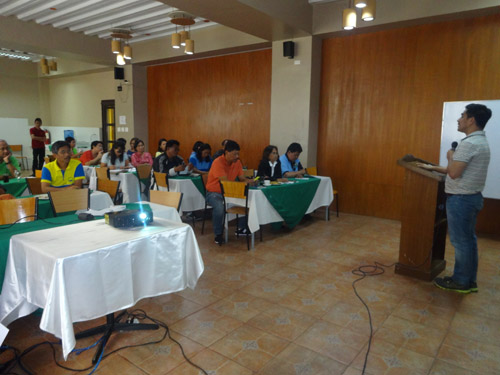 RPCO V I-PLAN Planning Specialist Mary Ann R. Cuya facilitates the PCIP Stakeholders’ Consultation on Cassava held on September 24, 2014 at Macagang Business Center in Nabua, Camarines Sur.
RPCO V I-PLAN Planning Specialist Mary Ann R. Cuya facilitates the PCIP Stakeholders’ Consultation on Cassava held on September 24, 2014 at Macagang Business Center in Nabua, Camarines Sur. PRDP promotes use of LGU commodity investment plan for a vibrant cassava industry in Cam Sur
September 29, 2015
Two months after the issuance of No Objection Letter 1 approving its proposed business enterprise for coco sap sugar, the province’s first priority commodity, the Provincial Project Management and Implementation Unit (PPMIU) of Camarines Sur is now working on the finalization of its Provincial Commodity Investment Plan (PCIP) for its second priority, the cassava.
In 2014, the province produced 76,518.51 metric tons of cassava making it the top cassava producer regionwide. Forty-eight percent of cassava produced in the province were sold to processor of feeds, 19 percent were sold to traders while 14 percent were sold to food processors. The rest of cassava produced were used for home-based processing and home consumption while others were given away, used for feeds or served as land owner’s share.
Camarines Sur belongs to the top eight cassava producing provinces in the Philippines with five percent contribution to the country’s total cassava production. As of 2012, 16,665 hectares of land in the province are devoted to cassava farming providing livelihood to 17,513 farmers.
Cassava has numerous uses both for food and non-food. Being rich in starch, cassava can be processed into flour and can be used as main ingredient for various food products such as cakes, pudding, and chips. It is also used in noodle and sago production. In addition, cassava is rich in glucose and fructose making it an effective sweetener in manufacturing beverages, candies, and pastries.
To tap these potentials and promote the development of cassava as a vibrant industry, the PPMIU-Camarines Sur is working closely with the Philippine Rural Development Project (PRDP) with focus on value addition. On September 24, 2015, the province had conducted the PCIP Stakeholders’ Consultation on Cassava at the Macagang Business Center in Nabua, Camarines Sur.
According to Provincial Sanggunian Member and Chair, Committee on Agriculture Nelson G. Julia, cassava production can be a good alternative source of income of farmers in Camarines Sur.
“Dakula an sakuyang pagtubod sa potensyal asin futuro kan local cassava industry (I highly believe in the potential and future of the local cassava industry),” Julia said.
PRDP Project Support Office (PSO) Planning Specialist Rey B. Lara stated that having a quality PCIP that is responsive to the needs of the cassava industry in the province can be an effective tool for a vibrant cassava industry in Camarines Sur.
“The province is the owner of the PCIP. Let the PCIP help support the industry,” Lara said.
Engr. Danilo Aman, Department of Agriculture (DA) Region V Cassava Program Coordinator, expressed his commitment to extend full support to the cassava value chain in order to boost the cassava industry in Camarines Sur.
In addition, the cassava industry stakeholders agreed to develop linkage network among farmers through associations, organizations and private companies to address the limited supply of planting materials during planting season. They also recommended the establishment of five commercial nurseries of high-yielding varieties (HYVs) of cassava for each district including in Sipocot, Pamplona, Caramoan, Iriga, and Goa. Training of trainors (TOT) and Farmer Field School (FFS) on integrated pest management (IPM), good agricultural practices (GAP), and modern farming techniques were also proposed to resolve low productivity due to use of traditional production technologies, practices and traditional varieties. As a proactive measure to the threat of Witches’ Broom Disease (WBD), the stakeholders suggested conducting information dissemination on the symptoms and control of WBD as well as the strict implementation of the Plant Quarantine Law.
They also cited the need to identify potential areas for organic certification, intensify campaign for organic cassava production, and provide funds for the development of Village Type Processing Center (VTPC) and Main Processing Center (MPC). Moreover, they pushed for the establishment of a cassava processing plant that is compliant to the Hazard Analysis Critical Control Point (HACCP) system and and food standards.
Once approved by the Provincial Development Council of Camarines Sur, copies of the PCIP will be given to all DA Bureaus, attached agencies, corporations, government financing institutions, other government agencies and private sector to enjoin them to support the commodity value chain by aligning their resources according to the interventions identified in the PCIP.
The PCIP is a three-year rolling plan between the DA and the provincial local governmentunit (PLGU) which was formulated based on commodity value chain analysis and stakeholders’ consultations. PRDP uses PCIP as a tool for implementation and basis in selecting eligible infrastructure and enterprise sub-projects.
PRDP is a six-year project being implemented by the Department of Agriculture that aims to establish the government platform for a modern, climate-resilient and market-oriented agri-fishery sector. (Annielyn L. Baleza, I-SUPPORT InfoACE Unit, DA-RAFIS 5)

PSO I-PLAN Planning Specialist Rey B. Lara discusses how a quality PCIP can be an effective tool in developing a vibrant cassava industry in Camarines Sur during the PCIP Stakeholders’ Consultation on Cassava held on September 24, 2014 at Macagang Business Center in Nabua, Camarines Sur.
